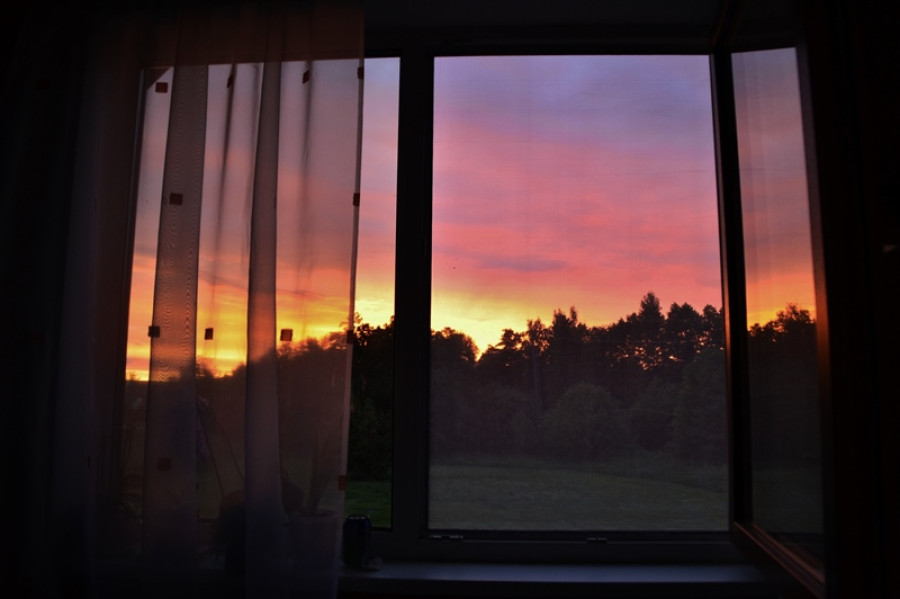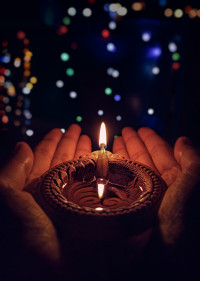As it is
Over the garden wall
A city girl’s nostalgic note on her (almost) private sanctuary in Kathmandu.
Sachi Mulmi
Our neighbours have a big, burly German Shepherd. I fell in love with him the first time I saw him when the family moved in around three years ago.
This brown- and black-furred animal sprinted around their little garden. When my neighbour was around, he would run around him excitedly. Though he had a naughty streak, he was extremely disciplined and never entered the house.
Pretty soon we were familiar with its meal times and other businesses. It was quite easy. All of us were keeping tabs on it, after all. Not only because we loved looking at the dog, but because over the years looking over the garden wall had become a habit for us. I’ll tell you why.
Before the family of two brothers moved in, before the house was even built, the plot of land used to be a big karesabari. There, the brothers’ mother, with a red, printed cotton scarf around her head, frowning behind her glasses, grew a variety of crops: pomelos, maize, beans, cauliflower, cabbage, guavas. And ever since we were young, we had developed a habit of looking out the window at the people hard at work on the bari.
Half a metre away from the fence that separated their bari from our sunless galli, they had big bushes of hydrangea growing lush enviable bunches in blue and pink. Anyone who passed by the place would try to see if they could touch the beautiful flowers. When they could, they would not spare a moment to pluck it.
While the women did that, teenagers would climb over the wiry fence and steal the guavas in late summer. Or the big, juicy pomelos available all year round. To keep the thieves away, she had the fence covered with zinc plates, blocking the view. But where there are fresh fruits to steal, the thieves find a way.
On quiet days, we could hear sparrows courting each other. They chirped and danced midair. At other times, they would try to steal the seeds and spend hours hovering over the plants for a good meal. The karesabari was their world and their playground.
Often, cats and dogs would also come to demonstrate their showmanship. Dogs would chase each other around, much like the sparrows or jureli chara, or dhobinis, and roll around in the mud nuzzling each other and doing whatever dogs do when they can do whatever they want.
Then, one day, the old lady had had enough of the thieves. She had the hydrangea bushes uprooted. That guava tree, too, didn’t stand the wrath of a woman wronged, despite its innocence. Beauty attracts all kinds of attention, most of it unwanted.
Thus we spent our days as silent spectators to the unfolding of the sombre events, gossiping about it over khana or tea time. What happened in the karesabari was none of our business so naturally we discussed it thoroughly between us family members, even running to the window to confirm what one of us witnessed.
At a tole where a dozen colleges and numerous houses had mushroomed, this space felt like a sanctuary for plants and animals. Even for us humans, who, because of the bari’s presence, could enjoy the graceful dawn and look at the twilight sky without any concrete structure obstructing the view. I could catch the sunrise and sunset on the mountains. I remember spending hours looking at the scene, mostly to unwind after a disappointing day. Even though it was not our bari, it gave our house plenty of space to breathe, and with that, to everyone who lived in it. In a time of big buildings, each standing tall to suffocate the other, it was a rare privilege.
This lasted only until the earthquake. Anyone who was here in April 2015 remembers the horror. Even during such tumultuous times, the bari gave us good respite. As the aftershocks continued, we dared not venture in the higher stories of our house and spent hours near the main door—in case we had to make a run for it. Thus we were all outdoors, listening to the twittering of birds and the rustling of the trees. The faint sound, the light twilight breeze, and nostalgic tales made things a little bit better.
We were just starting to settle down into the life after the earthquake when we heard that the owners wanted to build a house and move in where karesabari was. The father of the household was shaken by the earthquake and wanted to build an earthquake-safe house.
For the next year and a half during its construction, I saw how feet by feet, the land changed and was replaced by a new house. I mourned the slow dying of the bari, and with it, a part of my day that was vital to me.
But then came the dog, breathing life into my neighbourhood. The bari had for years kept welcome (and unwelcome) spectators entertained, but all that had stopped when the house was built. Now, with the dog around, things have become a little lively, for the neighbourhood and for me. I spend time just looking at the dog’s tactics, calling out its name, hoping it barks a friendly hello at me. And though I’ve had no luck so far, it doesn’t feel all that bad.




 17.12°C Kathmandu
17.12°C Kathmandu










